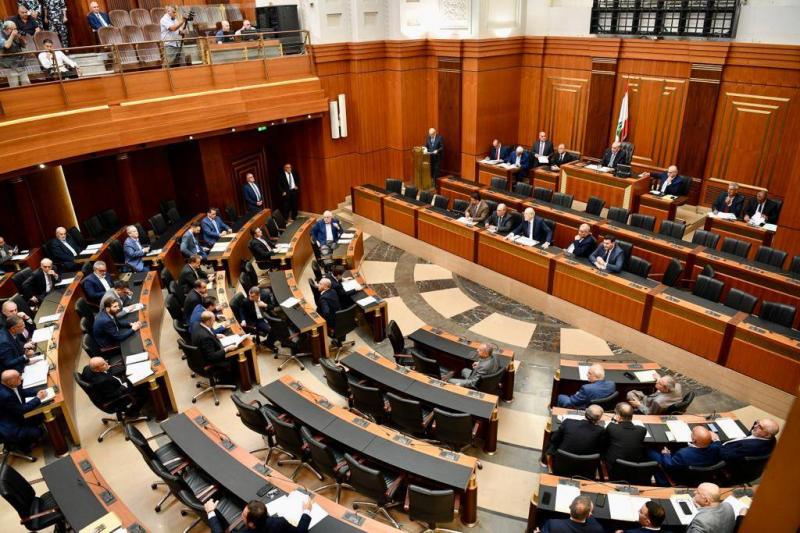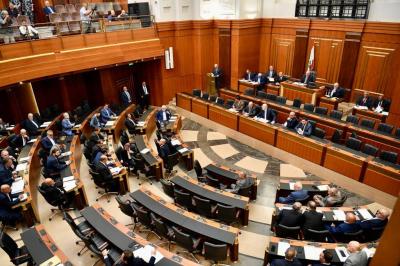The House of Representatives approved two proposed laws during its legislative session today, Monday. The first aims to open allocations in the 2023 budget before its ratification, presented by MPs Elias Bou Saab, Saji Attieh, Ali Hassan Khalil, Jihad al-Samad, and Bilal Abdullah. This proposal is designated to provide temporary compensation to all public sector employees and retirees who benefit from a pension, in addition to increasing the transportation allowance for all public sector employees. The second proposal pertains to opening an allocation of 265 billion Lira to cover financial incentives for transportation for Lebanese University professors to enable them to complete the 2022-2023 academic year.
At the beginning of the session, Speaker Nabih Berri emphasized that “there are those who interpret the constitution to mean that the government and parliament cannot convene, and that the parliament does not operate or legislate. Thus, if we want to respond to these individuals, we must not act.” During the session, caretaker Prime Minister Najib Mikati stated that "the allocations for these proposals are secured, and there are assured revenues in the budget, thus the cabinet fulfills its role to run state affairs and does not pass anything unnecessary." He pointed out that "the 2023 budget is ready, and we will call for consecutive governmental sessions to approve it." Mikati noted that the Ministry of Finance would send the final budget project to the government before the end of June to start discussions.
Head of the Finance and Budget Committee, MP Ibrahim Kanaan, stated that "allocations should come with a budget first, even in draft form, to rely on Article 12 of the Public Accounting Law," considering that "the only ceiling imposing the approval of salaries today is the higher interest of the state, concerning the livelihoods of 400,000 families that should not bear the burden of political disputes and varying constitutional interpretations."
Deputy Speaker Elias Bou Saab mentioned that today's legislative session "is not a message to anyone but to secure the salaries of public sector employees solely." He added, "If the Free Patriotic Movement had not attended today's session, I would have approached President Berri and wished that the session not be held." Bou Saab viewed that Speaker Nabih Berri considers necessary legislation, while the government does not take any considerations. The session was attended by more than 70 deputies from the "Development and Liberation," "Loyalty to the Resistance," "Democratic Gathering," "Independent Consultative Meeting," which also includes the "National Moderation" bloc, the "National Consensus" bloc, the "Strong Lebanon" bloc, and the "National Bloc."
MP Melhem Khalaf commented after the legislative session, in the presence of MP Paula Yacoubian, that "the session violates the constitution and the principle of continuity of public authority." He added, "The second part pertains to today's session, which we considered legislative, and it actually shows that there is no change in the approach to managing the state." He pointed out that the purpose of this session is to "mislead people into thinking they are being granted their rights when in reality they are not, they are only sedating the populace, I do not know where they obtain the funds. They give money with one hand and take it back with the other. The dues owed to the state must be clarified, but we need to know where we will source this money."
Opposition forces, particularly the "Strong Republic," "Kataeb," and "Renewal" blocs, along with several change-oriented and independent MPs, boycotted the session, firmly rejecting holding legislative sessions before electing a president for the republic. Opposition MPs argued that "the session is unconstitutional because additional allocations cannot be approved in the absence of the 2023 budget, which has not been prepared by the government that has lost parliamentary and popular confidence, and has not provided any solutions to the crises we suffer from."
Before the session convened, the "Strong Lebanon" bloc and the "Free Patriotic Movement," after a midnight meeting chaired by MP Gebran Bassil, announced their "decision to participate in the legislative session today, provided that its agenda is limited to the public sector salaries item only, without adding any other items outside the agenda." The bloc confirmed that "this position aligns with the rule it adopted by limiting its participation in legislating necessary issues related to the higher interest of the state or urgent strength, ensuring that this interpretation is not expanded, as has occurred until now with only two laws passed during the current presidential vacancy, contrasting with dozens of laws passed during the previous presidential vacancy (2014-2016), while affirming that it will not participate in any future legislation that does not fall under emergency and necessity circumstances, in addition to the inability to find a solution except through legislative action by the parliament, similar to what happened regarding municipalities, mayors, and public procurement laws."




